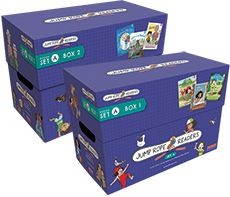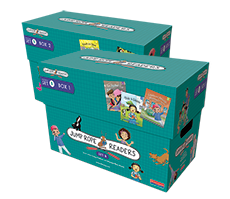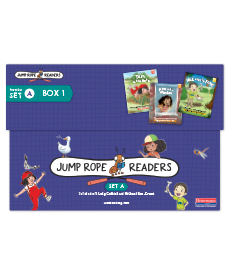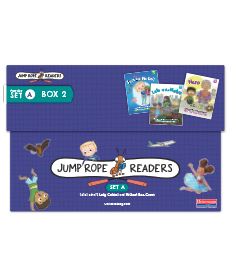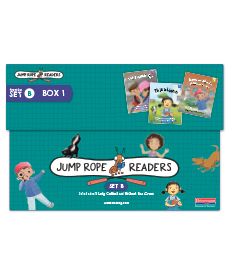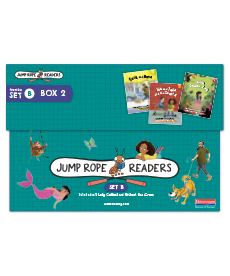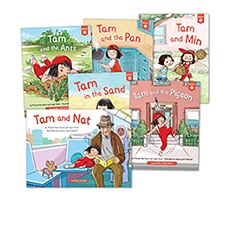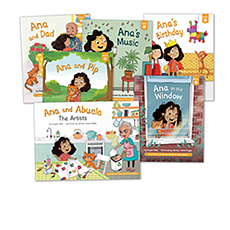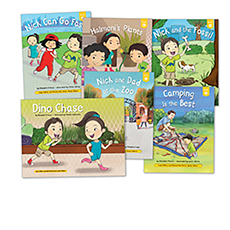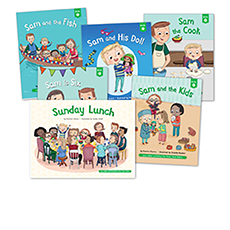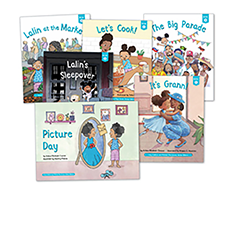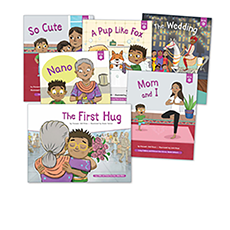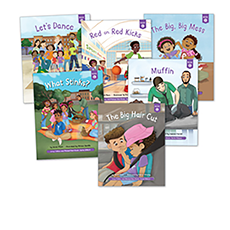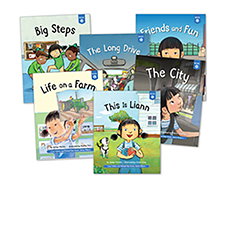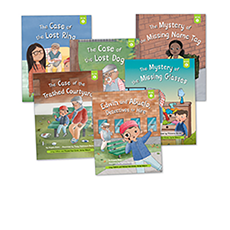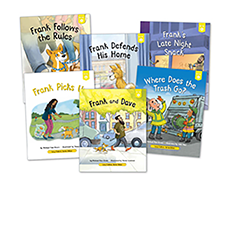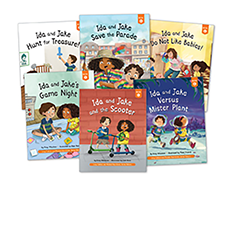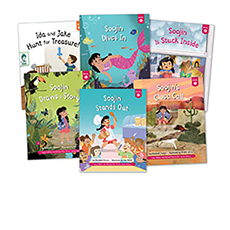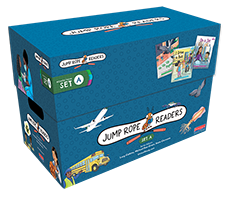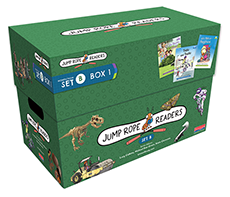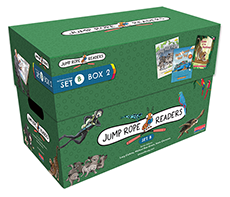Jump Rope Readers
Fiction and NEW Nonfiction Decodable Books
Hear more about the Jump Rope Readers progression across fiction and nonfiction!
The Jump Rope Readers are a series of engaging fiction and nonfiction decodable books that beginners can and want to read. Combining the best qualities of children's literature and accessible decodable texts, the Jump Rope Readers are designed to be interesting, comprehensible, instructive, and representative, which makes them a must-have addition to K–2 classrooms.
The Jump Rope Readers are arranged into different series, each starring a distinctive main character that students will enjoy getting to know. Each fiction book features new letter-sound correspondences or phonics concepts, as well as a few new high-frequency words to help students build decoding skills. After kids have read several fiction books, they can read a matching set of nonfiction books that give them opportunities to practice all of the phonics they have learned up to that point, while learning about new content in a new genre.
Together, the fiction and nonfiction Jump Rope Readers provide cumulative decoding practice across a gradual phonics progression that supports skill-building as students move towards the ultimate goal of reading confidently and fluently.
Four Key Qualities of Beginner Books


Influential reading researchers Richard Anderson and Freddy Hiebert described the key qualities that educators should look for in books for beginning readers in a report they wrote for the National Academy of Education. They wrote:
"Writing the first selections a child will read is a difficult balancing act. Ideally, the selections will be:
- interesting (so that students will want to read them);
- comprehensible (so that students are able to understand them); and
- instructive (so that students will learn from them)."
Of course, a quality that underlies all of this is representation. When books are an
accurate reflection of our beautifully diverse world, children find them
considerably more interesting and comprehensible, so we added that
foundational idea
to the list of essential priorities that informed the development
of the Jump Rope
Readers series.
Instructive Content
Like all decodable books, the Jump Rope Readers start off simple, then gradually grow in complexity as more phonics content is added. The books follow a scope and sequence of letter-sound correspondences and high-frequency words that aligns with the phonics progression behind the Units of Study—and this same progression, or one quite similar to it, informs most other phonics programs as well.

Within this progression, the texts don't introduce every letter-sound correspondence in the English language (there are over two hundred), but rather focus on those letter-sound correspondences that occur most frequently in print, providing kids with an efficient path toward more advanced reading.
Overall, the scope and sequence offers a steady "ramp" into early trade books. By the time students have finished the last Jump Rope Reader, they'll have lots of letter-sound correspondences under their belts, and they'll be ready to tackle familiar series such as Fly Guy, Yasmin, Henry and Mudge, or Sofia Martinez. Ready, that is, for a deep dive into the wider world of children's literature.
Series Components
About the Jump Rope Readers
The Jump Rope Readers are a series of engaging and diverse decodable books that captivate beginning readers. As you explore the Jump Rope Readers fiction books, you'll notice the books are arranged into different series, each starring a distinctive main character that students will enjoy getting to know. We meet these familiar characters again as they make special guest appearances in later fiction books, and then in each nonfiction book where they invite children to explore high-interest social studies and science topics inspired by story elements from the fiction series.
Each fiction book introduces new phonics features and high-frequency words to help students build skills. After kids have read several fiction books, they can read a matching set of nonfiction books that give them opportunities to practice the same words and letter-sound correspondences while learning about new content in a new genre.
Together, all of the Jump Rope Readers provide a progression of skill building and supportive practice that allows students to gradually improve their skills as the step up towards the ultimate goal of reading confidently and fluently.

Fiction Books

Nonfiction Books

Digital Access

Phonic Decoding Assessment
Fiction Series Introduction Videos
Learn about the Jump Rope Readers decodable books and meet the authors (and their characters!) in these short introductory videos.
Gold Fiction Series
Purple Fiction Series
Grape Fiction Series
Blueberry Fiction Series
Tangerine Fiction Series
Raspberry Fiction Series
Samples and Overviews
Decoding is an essential part of learning to read, and the decodable books that you give to your students can make all the difference. lf we want kids to become strong readers, they need plenty of practice with books that interest and motivate them.
Learn more about the Jump Rope Readers decodable books and request your sample.
Ordering Information
The links below offer the online ordering options for the Jump Rope Readers. Please be sure to reach out to your local Heinemann sales rep to discuss your purchasing options.




